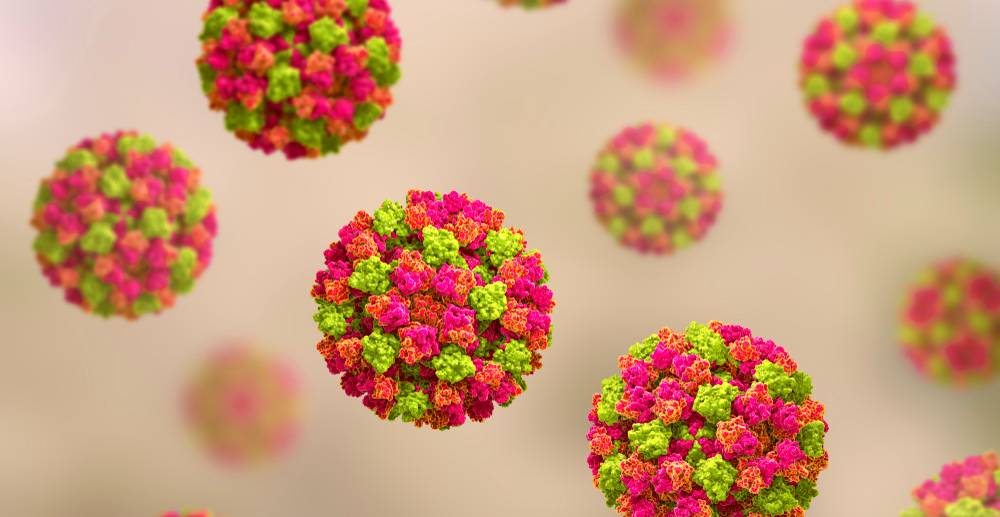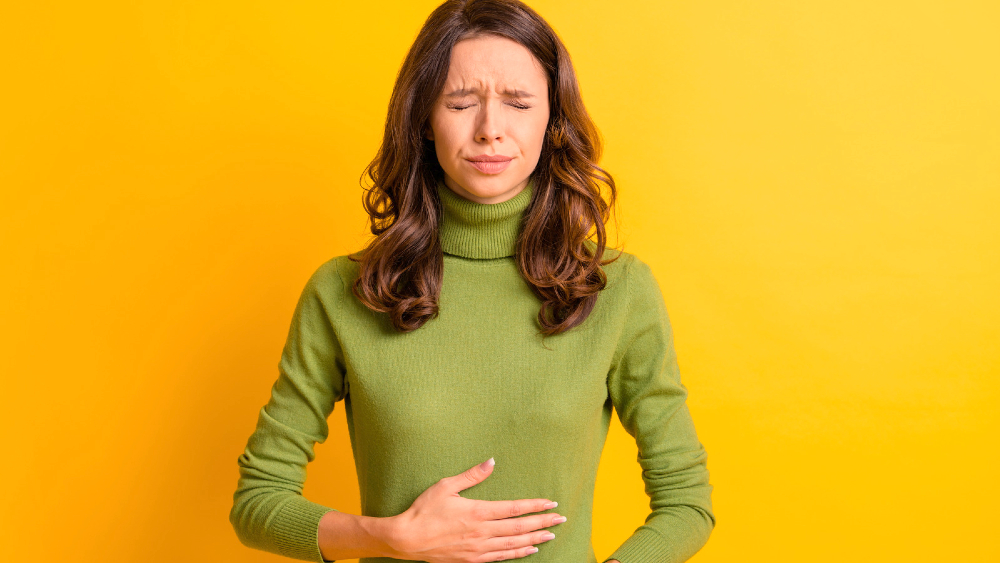Gastroenteritis, also called stomach flu, is an inflammation of the mucous membrane of the stomach and intestines. Stomach flu is usually not severe in healthy people, but sometimes it can cause dehydration or more severe symptoms.
Stomach flu: General about stomach flu | Causes | Symptoms | When to see a doctor | Diagnosis and treatment | Questions and Answers | Sources/references
Stomach flu is triggered by an infection that causes inflammation of the lining of the digestive system. It can cause vomiting, diarrhea, abdominal pain, and nausea. Milder forms can be managed at home by drinking fluids, but older people, children, and those with weakened immune systems are at risk of complications.
Adults and older children should seek medical attention if their symptoms include fever, severe abdominal pain, blood in diarrhea, or signs of dehydration such as thirst, decreased urination, lethargy, dry mouth, sunken eyes, or faintness.
Causes of stomach flu
The most common way of developing viral gastroenteritis – the stomach flu – is through contact with an infected person or consuming infected food or water.
Image: norovirus is the most contagious form of the virus that causes the stomach flu.

There is no effective treatment for viral gastroenteritis, so prevention is critical. Avoid food and water that may be contaminated, and wash your hands thoroughly and often.
Causes include:
- viruses
- bacteria
- parasites
- chemicals
- reactions to certain medicines and food
Video content: what is the difference between food poisoning and the stomach flu?

Viral gastroenteritis or stomach flu is the most common type and can be caused by many viruses. When gastroenteritis is caused by consuming food or drink contaminated with viruses, bacteria, parasites, or chemicals, the condition is called food poisoning.
Norovirus is remarkably contagious, meaning it spreads quickly from person to person. Norovirus can survive for months on surfaces such as countertops and changing tables. When an infected person vomits, the virus can become airborne and land on surfaces or another person.
Various viruses can cause the stomach flu, including:
- Norovirus: This is the most contagious form
- Rotavirus: This virus is widespread between December and April
- Adenovirus: infection with this virus can manifest itself with many symptoms
- Astrovirus: mainly affects a weaker immune system
Image: norovirus is often spread among children as they spend time together in kindergarten or school.

Stomach flu spreads quickly between people. A higher probability of infection occurs in the following persons:
- children in kindergarten or societies
- pensioners in nursing homes
- students living in dormitories
- persons with an immunocompromised condition
- travelers in less developed countries
- persons in psychiatric wards
- cruise passengers
- prisoners in prisons
- military personnel
Norovirus spreads quickly in all public places, such as hospitals, nursing homes, and schools. In addition, you can become infected if small particles of an infected person's vomit or stool pass into your mouth through close contact with someone with norovirus.
What are the symptoms?
Symptoms usually last only a day or two, but occasionally they can last up to 14 days. Because the symptoms are similar, confusing viral diarrhea with diarrhea caused by bacteria such as Clostridioides difficile, salmonella, Escherichia coli, or parasites such as giardia is easy.
Image: gastroenteritis includes symptoms such as diarrhea, stomach cramps, nausea, or vomiting.

Symptoms most often appear within 4 to 48 hours of contact with the virus and include:
- diarrhea
- nausea
- vomiting
- chills or sweating
- muscle and joint pains
- abdominal pains
- poor appetite
- weight loss
- fever
Usually, most people recover quickly from the stomach flu. However, symptoms may be more severe in infants, young children, older adults, or people of any age with weakened immune systems. In addition, vomiting and diarrhea can cause dehydration quickly, depending on the circumstances.
Video content: treatment of dehydration in children: oral rehydration therapy.

Signs of dehydration:
- extreme thirst
- Less urine output than usual
- urine that is darker in color
- sunken cheeks or eyes in an infant
- dizziness when standing up
- general weakness
When to call the doctor?
Seek medical help if you have frequent episodes of vomiting and cannot keep fluids down, have diarrhea for more than three days, have severe abdominal pain with cramps, have a high temperature, show signs of severe dehydration, or have neurological symptoms such as blurred vision or muscle weakness.
Image: See a doctor immediately if your child shows signs of dehydration.

If you are an adult, call your doctor if:
- blood appears when vomiting
- vomit or have diarrhea for more than two days
- you have severe abdominal pain
- you have a fever above 40 °C
- you notice the presence of blood in the stool
- you are dehydrated
See a doctor right away if your child:
- suffering from a fever of 39°C or more
- looks tired or very irritable
- suffer from significant discomfort or pain
- suffering from bloody diarrhea
- suffering from dehydration
Diagnosis and treatment
During the examination, the doctor will usually look for signs of dehydration. Stool sample tests can also identify the virus causing the disease to see if bacteria are causing the problem. In most cases, this test is not necessary.
Image: Drinking fluids and replenishing electrolytes to prevent dehydration is essential.

The most important solutions to the stomach flu are rest and staying hydrated. During diarrhea and vomiting, your body loses water and electrolytes. So if your stomach is still upset, you can drink small sips of water, sports drinks, tea, or soup more often.
It is essential to know that water alone may not be enough to hydrate in severe cases of diarrhea, so take care of electrolyte balance. Then, when you feel hungry again, eat regular food.
You may also take anti-vomiting and anti-diarrhea medications. Some medicines are available in pharmacies, but always check the instructions that come with them; you can also ask a pharmacist or personal physician for advice on whether they are suitable.
You can also provide care from home if your child has diarrhea and vomiting. There is usually no specific treatment, and your child should feel better within a few days. A doctor visit is unnecessary unless the symptoms do not improve or there is a risk of more severe complications.
Encourage the child to drink a lot of water, as it needs to replace lost fluids. You can also use special drinks from bags bought in pharmacies for rehydration. Babies should continue feeding as usual, either with breast milk or other formula.
Image: Babies and children need more sleep when sick, so long or extra naps are especially recommended.

Ensure your child gets enough rest and let them eat. If they are eating solid food and are hungry - try small amounts of plain food such as soup, rice, pasta, and bread. You can also offer paracetamol to the child if he has a fever or pain.
Proper hand washing, cleaning surfaces that may be contaminated with germs, and safe food preparation can help prevent some infections that can cause gastroenteritis. There are also vaccines for babies to protect against rotavirus infections.
Questions and answers
Can stomach flu cause more severe complications?
Viral gastroenteritis or stomach flu can become dangerous, especially if it causes dehydration. Anyone with signs or symptoms of dehydration should see a doctor right away. A person with severe dehydration may need hospital treatment. Older adults, children, and those with weakened immune systems are at risk of developing such complications. In addition, vomiting and diarrhea can cause dehydration quickly [1].
Signs of dehydration:
- extreme thirst
- Less urine output than usual
- urine that is darker in color
- sunken cheeks or eyes in an infant
- dizziness when standing up
- general weakness
How does the stomach flu virus spread?
The most common way to develop viral gastroenteritis is to contact an infected person or consume infected food or water. Avoid food and water that may be contaminated, and wash your hands thoroughly and often. Norovirus spreads incredibly quickly in public places. You can become infected if small particles of an infected person's feces or stool enter your mouth through close contact[2].
Image: hand washing kills almost all germs; take care of cleanliness and hygiene.

How is stomach flu treated?
The most important solutions to the stomach flu are rest and staying hydrated. During diarrhea and vomiting, your body loses water and electrolytes. So if your stomach is still upset, you can drink small sips of water, sports drinks, tea, or soup more often.
You may also take anti-vomiting and anti-diarrhea medications. Some medicines are available in pharmacies, but always check the instructions with them; you can also ask your pharmacist or personal physician for advice on whether they are suitable.
Sources and references
1. Symptoms & Causes of Viral Gastroenteritis ("Stomach Flu") - https://www.niddk.nih.gov
2. How Norovirus Spreads - https://www.cdc.gov
3. Hydrating and













